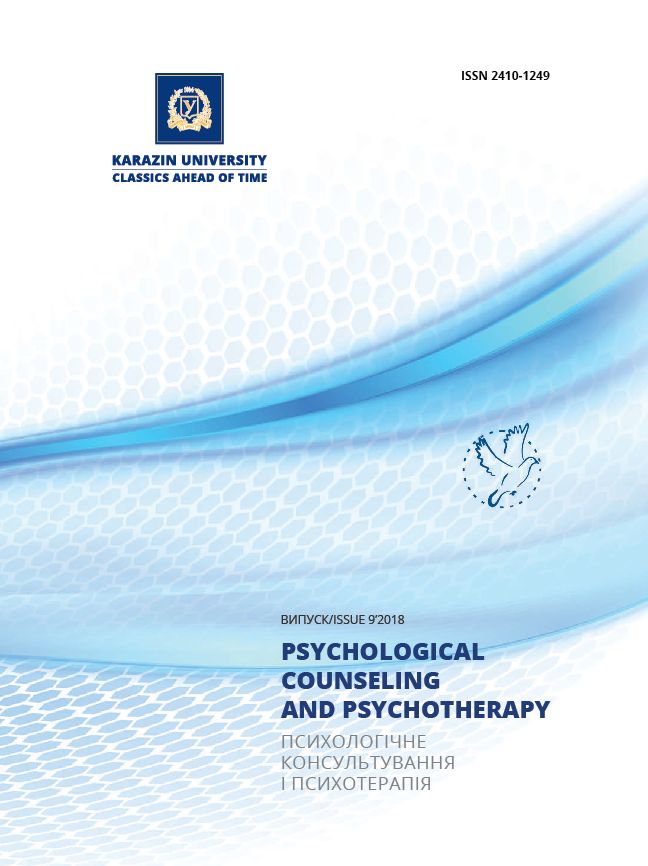TRUST AS A PREDICTOR OF OPTIMAL PERSONALITY FUNCTIONING
Abstract
In the study the problem of optimal personality functioning is regarded. The theoretical background of the OPF in different approaches shows that the existing a general understanding of OPF is too wide and more concrete approaches to it include different components regarding the views of the authors to the personality. The humanistic approach to the personality views OPF in terms of personal growth, self-actualization, autonomy, values and goals. The model of OPF, consisting of two domains, is proposed. These domains are C. Ryff`s model of psychological well-being and S. Maddi’s hardiness. Both constructs grew out of humanistic views on human nature and have theoretical and empirical background. Trust is regarded as an important predictor of OPF. Despite the existing personality development theories, which postulate that trust is the basic disposition for personality functioning and it influences its interactions with the world, we observe the lack of empirical studies devoted to trust as a well-being or OPF predictor. The empirical study of indexes of OPF (consisting of PWB and hardiness) and trust at the sample of students was provided. The data of correlation analysis, regression analysis and structural modelling empirically confirm the validity of model of OPF, including domains of PWB and Hardiness. We also provide the evidence of importance of general trust and self-trust for OPF.
Downloads
References
Christie A.M.H., Jordan P.J., Troth A.C. (2015) Trust antecedents: emotional intelligence and perceptions of others, International Journal of Organizational Analysis, Vol. 23 Issue: 1, pp.89-101, https://doi.org/10.1108/IJOA-07-2013-0695
Helliwell J.F., Wang S. (2011). Trust and wellbeing. International Journal of Wellbeing, 1(1), 42-78. doi:10.5502/ijw.v1i1.9
https://www.aapb.org/i4a/pages/index.cfm?pageID=3641&activateFull=true
Kryazh, І., Grankina-Sazonova, N. (2018). Mediating role of trust between emotional intelligence and positive functioning of personality. Fundamental and applied researches in practice of leading scientific schools, 26 (2), 326–334.
Kryazh I.V., Grankina-Sazonova N.V. (2017) Trust and emotional intelligence as psychology students` personal wellbeing. Psychology: reality and perspektives: scientific studies series of Rivne State Humanitarian University. – Iss.8. – p. 137-143 [in Ukrainian]
Kryazh I. I., Levenets N. V. (2018) Trust and Emotional Intelligence as Predictors of Subjective Wellbeing of Students. Messenger of V. N. Karazin Kharkiv National University. Series: “Psychology”. Vol. 64. [in Ukrainian]
Kupreichenko A. B. (2008) Psychology of Trust and Distrust. M: Publisher “Institute of Psychology RAN”. 564p.
Levesque R.J.R. (2011) Optimal Functioning. In: Levesque R.J.R. (eds) Encyclopedia of Adolescence. Springer, New York, N.Y.
Maddi S. R. (2002) The Story of Hardiness: Twenty Years of Theorising, Research and Practice– Consulting Psychology Journal: Practice and Research – Vol.54 – No3 – p.175-185. DOI:10.1037//1061-4087.54.3.175
Malkina-Pykh I. G. (2014) Predicting and increasing subjective well-being: response function model and rhythmic movement therapy. Report on the 28th Conference of the European Society of Health Psychology “Beyond prevention and intervention: increasing well-being” 26 – 30 August, 2014, Innsbruck, Austria. DOI: 10.13140/2.1.4118.0968
Osin E. N., Rasskazova E.I. (2013) Short version of hardiness test: psychometrical characteristics and providing in organizational context. Messenger of Moscow University. Series 14. Psychology. Iss. 2. 147-165 [in Russian].
Ryan M. R., Huta V., Deci E. L. (2008) Living Well: a Self-Determination Theory Perspective on Eudaimonia. Journal of Happiness Studies. – 9:139-170. DOI: 10.1007/s10902-006-9023-4
Ryff C. D. (1989) Happiness is everything or is it? Explorations on the meaning of psychological well-being. Journal of Personality and Social Psychology. – Vol.57. – No.6. – P.1069-1081
Satterfield, J. M. (2001). Happiness, excellence, and optimal human functioning: Review of a special issue of the American Psychologist(2000;55:5-183), Martin E P Seligman and Mihaly Csikszentmihalyi, guest editors. Western Journal of Medicine, 174(1), 26–29.
Schumacker R. E., Lomax R. G. (2010) A Beginner’s Guide to Structural Equation Modeling Third Edition. New York: Routledge. Taylor & Francis Group, 504 p.
Seligman M. E. P. (2006) Novaya pozitivnaya psihologiya: nauchnyiy vzglyad na schaste i smyisl zhizni [New positive psychology: a scientific view of happiness and the meaning of life.]. M. Izdatelstvo «Sofiya». 368p.
Skripkina T. P. (2000). Psychology of Trust: Guideline for Students of Higher Education Institutions. Moscow: Academiya, 264p. [in Russian]
Steiger, J. H. (1994) Factor Analysis in the 1980’s and the 1990’s: Some Old Debates and Some New Developments. Trends and Perspectives in Empirical Social Research. Ingwer Borg and Peter Ph. Mohler (Eds.). Berlin: Walter de Gruyter, р.201-224
Walsh W. Bruce (2014) Counseling Psychology and Optimal Human Functioning. Vocational Psychology Series. Routledge. Available at
Wulanyani N. M. S. and Vembriaty N. (2018). What factors influence Well-being of Students on Performing Small Group Discussion? J. Phys.: Conf. Ser. 953 (2017) 012004 doi: 10.1088/1742-6596/953/1/012004








